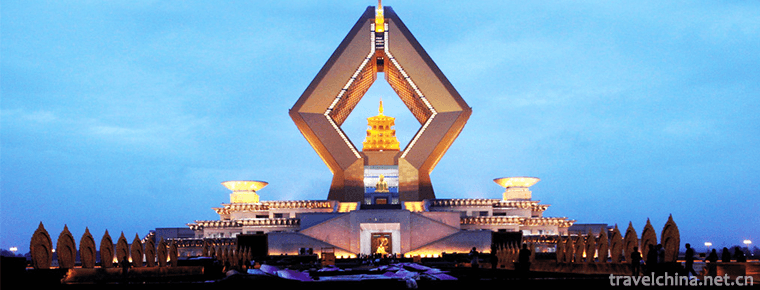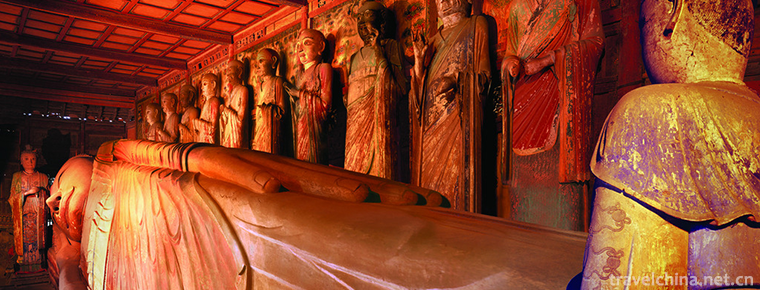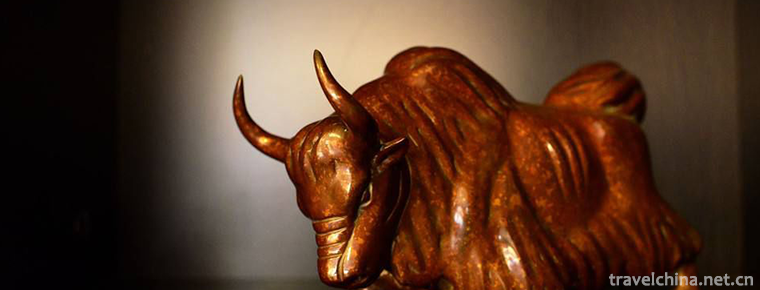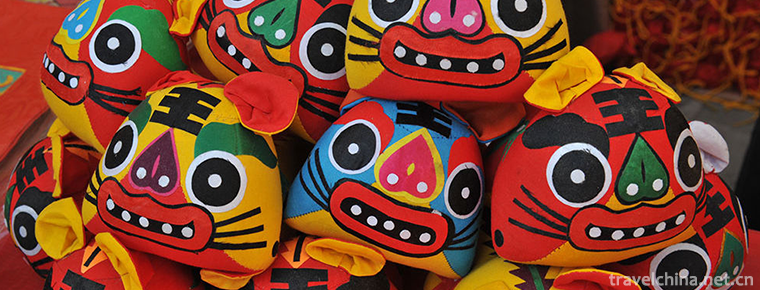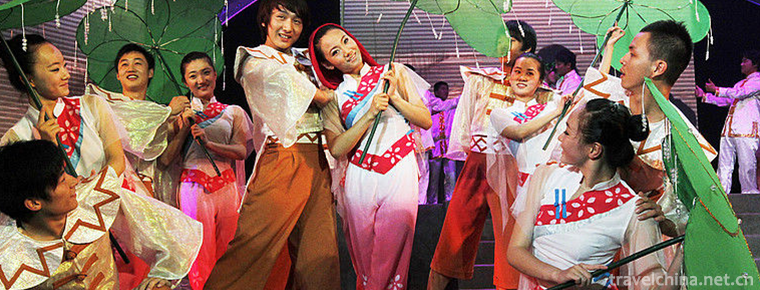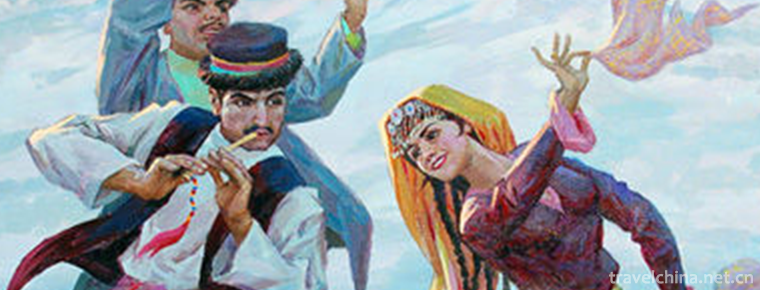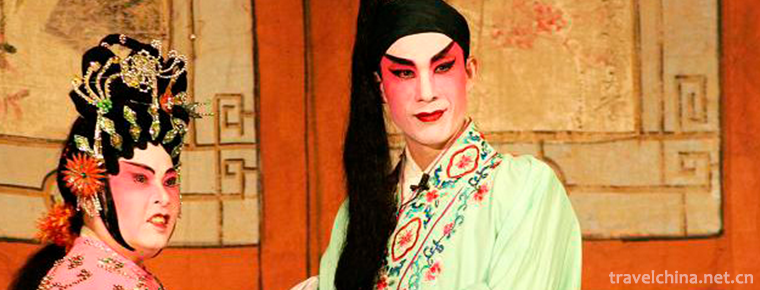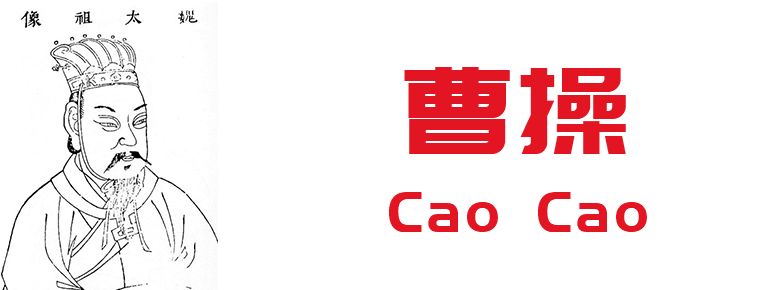Mulian Opera
Mulian Opera
Mulian Opera is an ancient opera with religious story "Mulian Save Mother" as its theme, which is preserved in folk activities. It is the first opera that can be tested at present. It is known as the "ancestor of Chinese opera".
Mulian Opera combines filial piety advocated by Buddhism and Confucianism. It has become one of the most influential operas in ancient Chinese operas, with the theme of Buddhist sutras and historical events. It is also one of the representative works of the combination of Buddhism and Chinese opera. Its earliest written records are found in the Yuyuan Yuan's "Tokyo Menghualu" in the Southern Song Dynasty. During the Ming and Wanli Dynasties, Zheng Zhizhen, a Qingxi native of Qimen, Anhui Province, wrote "New Catalogue of Lian Jiu Mu Su Shan Opera" on the basis of past Zaju, Bianwen and legends, which became very popular. Not only did the original variety of operas with tune take it as the blueprint of performance, but also spread in the north. In the Qing Dynasty, Mulian Opera performed throughout the country and entered the court. Mulian Opera was once widely spread in Anhui, Jiangsu, Zhejiang, Jiangxi, Hubei, Hunan, Sichuan, Shanxi, Fujian, Henan and other places. With the spread of Buddhism, Mulian Opera even spread to the southeast coast and Sichuan-Yunnan and other places. Among them, Mulian Opera in Huizhou of Anhui Province, Chenhe of Hunan Province and Nanle of Henan Province are the representatives.
Mulian Opera is a complex phenomenon of literature and art. It is the accumulation of various thoughts and histories. It covers a variety of thoughts and arts. Confucianism, Buddhism and Taoism are integrated in the ideological content; in the artistic form, when Mulian Opera is performed, there are roles and acts, singing, doing, reading and playing, including all kinds of acrobatics, singing and dancing, hundred operas, and a large number of folk customs, and pay attention to the characterization of characters and the arrangement of contradictions and conflicts, which has the integrity of structural art. It is a study of the formation and development of Chinese opera. Excellent case studies.
On May 20, 2006, with the approval of the State Council, Mulian Opera (Huizhou Mulian Opera, Chenhe Mulian Opera and Nanle Mu Opera) was listed as the first national intangible cultural heritage list.
The Origin and Development of Plays
Mulian Opera, a traditional opera, specializes in "Mulian Save Mother". Its stories originated from Buddhist classics such as Sutra, Buddha's Saying the Plumbar Sutra and so on. By the Tang and Five Dynasties, there were many variations about Mulian, and the story became more and more complete. It has historically been associated with the rise of various arts and the rise and fall of Buddhism. People in Tang Dynasty adapted into rap literature "Mulian Save Mother", and there were seven days of "Mulian Save Mother" Zaju in Northern Song Dynasty. According to the old man of Song and Meng Dynasty, Tokyo Dream Hualu, he said, "Since the seventh night, he has been trying to save his mother's dramas until the fifteenth day." By the Ming Dynasty, legendary scripts such as "Mulian Save Mother and Advise Good Mother" had been published one after another. Mulian Mother was often sent to hell, suffered various hardships and retributions. She did not avoid hardships and dangers, traveled all over the hell to seek her and seek Buddha to save her as the main plot. At the same time, it promoted feudal filial piety, religious superstition and karma. There are many juggling performances in the play, such as duxle, turning table, pedaling, jumping rope, jumping circle, channeling fire and so on. As well as many independent folk tale short play, such as "Downhill", "Dumb Back Mad Woman", "Wang Po Curses Chicken", "Zhao Hua Da Lao Tzu" and so on. In the reign of Kangxi in the Qing Dynasty, the royal family played the legend of Mulian Save Mother. During the reign of Emperor Qianlong, Neiting also produced "Jianshan Jinke", 240 plays, which were performed in 10 days.
In the early Ming Dynasty, there were opera troupes in Nanling, Anhui Province, mainly performing Mulian Opera. Afterwards, there are many places in Anhui, such as Jingxian, Jingyang, Xuancheng and Taiping, Liyang and Yixing in Jiangsu, Shaoxing, Xinchang and Kaihua in Zhejiang, Wuyuan in Jiangxi, and Hunan, Sichuan and Shanxi.
Opera troupes or Mulian Opera performances. Mulian Opera went through the process of entering the court from the folk, sorting out, refining and perfecting the court, and then going to the folk. Mulian Opera has spread all over the country in modern times, especially in the south. Fujian, Zhejiang, Jiangxi, Sichuan, Guizhou, Hunan and other provinces have their own Mulian Opera. No matter where Mulian Opera is, it is based on the stories of Fu Xiangguang's marriage to heaven, Liu's swearing to go to hell, Fu Luobo's conversion to Buddhist Dharma to save his mother, and eventually to the rise of Hezhai. All over the country, it has added branches and leaves to make up the repertoire of loyalty, filial piety, Festival and justice (or strong) advocated by Confucianism and Taoism, which has nothing to do with Mulian opera.
Mulian Opera is a combination of opera, dance, acrobatics and martial arts, including sawing, grinding, swallowing fire, smoking, opening, color tricks and forks, rolling fork, golden hook hanging jades, playing with water snakes, digging four doors and other dance movements, as well as many boxing routes such as King Kong Quan, Wusong Huaquan and Wulong Exercise Quan. It has its own unique features in clothing, props, makeup and performances. The performance is an old tune, which was changed from Huagu tune to Daping tune in Qing Dynasty. Most of the songs are high-pitched, accompanied by drumming festivals and gongs and cymbals. Later, some of them were influenced by Hui Opera and folk songs, and changed to different tunes. The basic singing tune is Yiyang tune, that is, Huizhou tune and Qingyang tune. A large part of the singing tune is from local or non-local folk minor, and some are very similar to Qiyunshan's Taoist tune. To drum festival, Gong and cymbal accompaniment, no orchestra, life is to use suona. Mulian Opera has broken through the limitation of opera plate, skillfully absorbed the characteristics of "miscellaneous local language" in Geyang Opera, and gradually evolved into a unique "Huizhou Opera". Mulian Opera, which is popular in Chizhou, has become a popular "Qingyang Opera", which is called "Huichi Elegant Tune" together with "Huizhou Opera", thus replacing the position of Geyang Opera in the theatre and laying a foundation for the development of Huizhou Opera later. Today's Hui Opera, Sichuan Opera, Han Opera, Wu Opera, Kunqu Opera, Huangmei Opera, Gui Opera and Hunan Opera still retain Folk Opera such as Shuangxia Shan, Wangpao Cursing Chicken, Dumb Back Madness, Old Back and Young.
The performance of Mulian Opera has the saying of "two heads are red". It starts at sunset and lasts until sunrise on the next day. It has a total of 100 plays, including "Mulian Niang Married", "Monks Downhill", "Selecting Sutras and Mothers" and so on. If a series of performances can be performed for seven days and seven nights. The performance of Mulian Opera integrates singing, doing, reading and playing, and Interludes acrobatic performances such as wrestling, jumping rope and pedaling. It is unique in the art of opera performance and has a great influence on other kinds of operas. The performances of Mulian Opera are quite different from those of other operas. "Mulian Opera" has no fixed performance venue, the whole village can be a stage for performance. From this point of view, Mulian Opera is more like a sacrificial activity.
The known Mulian dramas are "Mulian Save Mother Suggesting Good Mother" by Zheng Zhizhen of Ming Dynasty, "Jianshan Jinke" by Zhangzhao of Qing Dynasty, and "Mulian Biography" by Gaoqiang of Sichuan Province, Shao Opera "Jiu Mother" and Puxian Opera "Mulian Save Mother" and so on. There are also many short breaks, such as "Downhill", "Dingji Huayuan", "Series Lian", "Move Uncertainty", "Men's Hanging", "Women's Hanging" and so on, which have become the traditional repertoire of many operas. Among them, "Shuangxia Shan" (also known as "Monk and Monk Club", "Mute Back Madness" (also known as "Xuelimei", "Lao Bei Shao"), and "Wang Po Curses Chicken" are still performed in Sichuan Opera, Han Opera, Wu Opera, Gui Opera, Shao Opera, Tune Opera, Kunqu Opera, Hunan Opera and other local operas.
Before the Cultural Revolution, Qi Opera and Chenhe Opera in Hunan could play the full version of Mulian Zhuan, which disappeared later. In 1984 and 1989, Hunan excavated and performed Qi Opera and Chenhe Gaoqiang Mulian Biography, which were videotaped by the Chinese Academy of Art. In Qi Opera Troupe and Huaihua, Mulian Opera Academic Symposium was organized, with the participation of experts and scholars from both sides of the Taiwan Strait and Japan, France, the United States and the Netherlands. There are many primitive opera cards and ancient artistic means in the play, and there are also many feudal dregs in the play. The excavation is not to advocate the original performance, but to study.
Mulian Opera is an ancient folk opera in China. It is also the most famous Buddhist drama with the most repertoire, the most complete preservation, the richest connotation and the largest scale in history. As the first proven drama in the history of Chinese opera, it is regarded as the originator of Chinese opera.
Cultural Value
Religious History
Mulian Opera propagandizes three religions, monks and Taoists in the play, which reflects the harmonious relationship among Confucianism, Buddhism, Taoism and witches in Chinese history. Mulian stories are based on Buddhist sutras. Mulian is one of the ten disciples of Sakyamuni. Mulian in Mulian Opera has become a Chinese monk, commonly known as Fu Luo. The local customs and customs in the play are all Chinese. From this, we can explore the process and reasons of the Sinicization of Buddhism after its introduction. Indian Buddhism was born. After monks and nuns became monks, they did not recognize their parents or worship kings. Buddhism entered China and became a member of the WTO. Advocate believers to refrain from doing evil, to do good, to be loyal to the emperor and filial piety to their parents. Mulian monk is a filial son who went through all the hardships to save his mother in hell. This change provides evidence for the study of Chinese Buddhist history.
First, the subject matter comes from Buddhist sutras and Taoism is everywhere.
The theme is from the Buddhist Mulian Opera, which has the brand of Taoism everywhere. For example, every day after the opening of gongs and drums in Lian Opera, there are "Official Blessing" and "Tian Jiang Ying Tai". After Mulian's father, Fu Xiangbo, helped the people, there were three official memorials; Fu Xiangbo died by riding a crane to heaven and so on. Zhenwu, Sanguan, Four Marshals, Tianjung Tianbing, Leigong and Dianmu, Zhou Gong and Taohua Nu are Taoist gods. They influence the development of the plot and add Taoist atmosphere to the stage.
Second, Taoism also has Mulian Opera
Apart from the traditional opera troupes in society, Taoism has its own traditional opera troupes and traditional opera troupes.
Guixi Longhu Mountain is a sacred place of Taoism. According to a survey by Mr. Mao Limagnesium of Jiangxi Opera Research Institute, Taoists living in Guixi do not perform Lianju, while Taoists living scattered at home often gather to perform Lianju because of their desire to reward gods and the need to be a Taoist venue. Yang Cun-en, Taoist priest of Lantang Village, Huangqiao Township, Jishui County, Jiangxi Province, is a Taoist pirate. Zidao is the 36th generation apprentice of Qiangdaoling. He said that it was inherited from his grandfather to perform a series of performances in the Taoist arena. They sing dramas without makeup or masks.
Puppets with strings in Quanzhou, Fujian Province, are well-known both at home and abroad. They used to be called Mulian puppets because they mainly performed operas with repertoires. According to Mr. Shen Jisheng of Fujian Opera Research Institute, Quanzhou Puppet Class is run by Yuanmiaoguan. In the sixth year of Xianfeng (1856), Yuanmiaoguan specially built a puppet shed (a puppet theater), which became the earliest indoor performance venue of five local operas in Quanzhou. Mulian puppets can perform for seven days and seven nights, including Li Shimin's traveling to the prefecture, the collection of Confucian classics in the Tang Dynasty and the rescue of his mother from Hell in Mulian.
In Quanzhou, Mulian Opera has been performed in Kaiyuan Temple, a Buddhist temple as well as Yuanmiaoguan, a Taoist temple. Because it is performed by monks, called monk opera; take the meaning of "breaking the iron siege city, making hell empty", also known as Dacheng opera; it is used to cooperate with Buddhist Dharma performance, also known as Dharma opera. Lin Shu (1852-1924), a modern writer and Fuzhou native, said in his funeral of Quanjun people: "Monks sing for the play"Mulian Save Mother"until dawn, which is called monk's opera." It can be seen that Zeng Chengquanzhou is a local custom.
History of Opera
The story of Mulian's rescuing mother was preached and sung by monks in temples in the Southern and Southern Dynasties, followed by the spread of variants and the performance of Zaju in the Song Dynasty. Only in the Ming Dynasty did literati compile scripts, and in the Qing and Qianlong Dynasties, they moved to court plays. Shortly afterwards, Zhang Zhaofengyi expanded the script 10 times, and changed the time to Tang Dynasty, including Yan Zhenqing and Duan Xiushi's stories. The theme of "talking about loyalty and filial piety" has never been highlighted. All of these provide a kind of research for the history of Chinese opera.
folklore
Mulian Opera retains many folk customs, and the characters and stories in it are localized. For example, Mulian's former residence was in Shehong, Sichuan, and Fu's tomb was in Changde, Hunan. In the play, Mulian's great-grandfather was Taishou in Changsha and returned home to Chaling. Hunan people are interested in the scholars who study folklore and folklore history, who are willing to adopt children such as Mulian and scold the worst women as Liu Siniang.
It is a custom in many places to perform a series of performances at funerals. There are many records in Hunan local chronicles.
Art History
Mulian Opera retains the performance means and techniques accumulated from the early stage of opera. The singing cards include Beiqu, Nanqu, North-South ensemble and local folk songs. The singing forms include solo singing, crowds singing and crowds helping. Mulian Opera of Qi Opera and Chenhe Opera has more than 200 opera cards of their respective genres, almost all of which are included. Among them, the original opera cards are very valuable. Variant opera cards reflect the law of high-pitched changes, and they are indispensable materials for the study of the history of opera art.

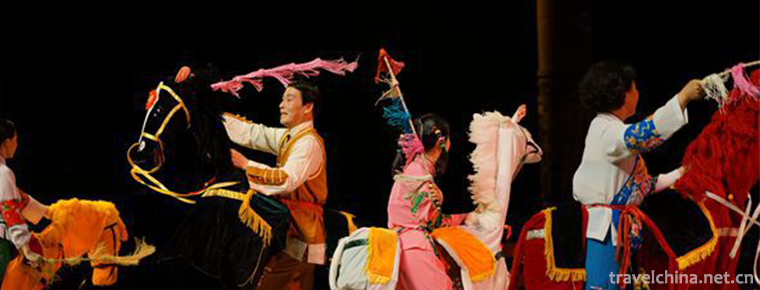
-
Famen Temple Buddhist Cultural Scenic Area
Famen Temple Cultural Scenic Area is located in Famen Town, 10 kilometers north of Fufeng County, Baoji City, Shaanxi Province. It is 110 kilometers east of Xi'an City and 90 kilometers west of Baoji .
Views: 255 Time 2018-12-12 -
Jiulushan Waterfalls Scenic Spot
JiuRushan Waterfall Group Scenic Area - National AAAA Class Scenic Area and National Forest Park, located in Xiying Town, Jinan City, Shandong Province, is the source of Jinxiuchuan Reservoir.
Views: 204 Time 2018-12-22 -
Zhangye Great Buddhist Temple
The Great Buddha Temple was built in the first year of Yongan, Xia Dynasty (1098), formerly known as the Kaye Tathagata Temple, in the ninth year of Yongle, Ming Dynasty (1411), and in the seventeenth.
Views: 171 Time 2019-03-16 -
Manufacturing Techniques of Spotted Copper
The bronze production technology, the traditional handicraft of Qujing City, Yunnan Province, is one of the national intangible cultural heritage..
Views: 144 Time 2019-04-03 -
Cloth tiger
Cloth tiger is a kind of traditional handicraft which has been widely spread among Chinese people in ancient times. It is also a good toy for children, indoor decoration.
Views: 246 Time 2019-04-04 -
Gaoyou folk songs
The earliest source of Gaoyou folk songs can be traced back to the Neolithic Age. Gaoyou Lake and Lixia River in Gaoyou City are the traditional folk songs widely spread in their production and life..
Views: 322 Time 2019-04-30 -
Uygur Sainem
Among the numerous traditional folk dances, "Sainem" is the most common form of Uygur folk song and dance. It is widely spread in the towns and villages in the north and south of Tianshan Mo.
Views: 155 Time 2019-06-27 -
Guangdong Opera YueJu
Guangdong Opera, also known as "Guangdong Opera" or "Grand Opera", is one of the traditional operas in Guangdong. It originates from Nanxi Opera and is popular in Guangdong and Gua.
Views: 173 Time 2019-07-16 -
Cao Cao
Wei Wu Di Cao Cao (155 years - 220 March 15th), the name is Geely, the word Meng De, nicknamed hide. Prefectural governor of Yuzhou Qiao (today) Anhui Bozhou Person . Eastern Han Dynasty Outstanding i.
Views: 378 Time 2019-09-07 -
Panzhihua after liberation
After liberation, Miyi County was established in some areas of Huili and Dechang in 1951, and renamed as Miyi County the next year, which was subordinate to Xichang District of Xikang province (due to its unique climate, rich products, especially rich in rice, and three crops a year, .
Views: 135 Time 2020-12-14 -
Suining history and culture
As a place name, "Suining" began in the Eastern Jin Dynasty. The Eastern Jin Dynasty coexisted with the Sixteen States, while Suining belonged to the Chenghan state. At that time, the rulers of various countries had been fighting with each other for years.
Views: 203 Time 2020-12-16 -
Meishan population
At the end of 2019, the total registered residence population was 3 million 422 thousand and 600, of which 1 million 194 thousand and 900 were urban population. At the end of the year, there were 2.995 million permanent residents, including 1.433 million urban.
Views: 333 Time 2020-12-18
